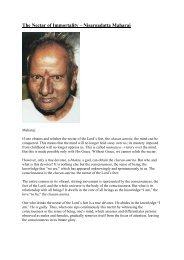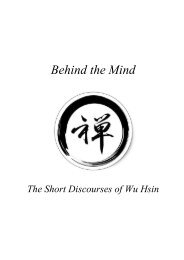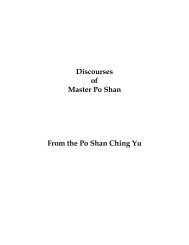Lalla-Naked-Song
Lalla lived in Kashmir in the 14th century, when many doctrinal streams were merging: Shaivism, sufism, Vedantic non-dualism, and other -isms, but Lalla is beyond religious categories, a living combination that cannot be described in those terms.
Lalla lived in Kashmir in the 14th century, when many doctrinal streams were merging: Shaivism, sufism, Vedantic non-dualism, and other -isms, but Lalla is beyond religious categories, a living combination that cannot be described in those terms.
You also want an ePaper? Increase the reach of your titles
YUMPU automatically turns print PDFs into web optimized ePapers that Google loves.
who moves through this poetry. The clarity, and her dancer's simplicity:<br />
amazement felt, stated, and then the moving on. Quick,<br />
sure, un-fancy steps that aren't trying to convince or impress, but<br />
to let you in her life. Her heart's cry is, Om Namah Shivaya, "I bow<br />
to the Highest Consciousness."<br />
I have come to <strong>Lalla</strong> after fifteen years of collaborative work on<br />
Jelaluddin Rumi. The difference in the two is considerable. Where<br />
Rumi is extravagant, <strong>Lalla</strong> is spare. Where Rumi is exuberant,<br />
<strong>Lalla</strong> is cold-sober. Rumi is intricate; <strong>Lalla</strong>, simple. Rumi works<br />
within a group; <strong>Lalla</strong> walks alone. Rumi is caressingly affectionate;<br />
<strong>Lalla</strong>, severely clear. Other polarities could be set up. Rumi is the<br />
imagination in full flower, always moving. <strong>Lalla</strong> is the condensed<br />
code of the body, the rooted, breathing word.<br />
Yunus Emre, the Turkish mystic, looked at the six volumes of<br />
Rumi's Mathnawi and said, "All these words!" Rumi asked, "How<br />
would you have done it?"<br />
"I would just wrap some skin around some bones and call it<br />
Yunus"<br />
I am reminded of an Emily Dickinson poem,<br />
The infinite a sudden guest<br />
Has been assumed to be,<br />
But how can that stupendous come,<br />
Which never went away.<br />
With Emily, <strong>Lalla</strong> stays home, like a lotus in the mud, whereas<br />
Rumi plays in the ocean of longing, a restlessness. Which seems<br />
oddly paradoxical to their actual lives: Rumi being located at the<br />
center of a community, and <strong>Lalla</strong> the wanderer.<br />
What I love about the poems is that they feel close to experience.<br />
Not the daily specifics, but an inner attention. Here is her<br />
statement about the use of poetry for the poet.<br />
I didn't trust it for a moment,<br />
but I drank it anyway,<br />
the wine of my own poetry.






